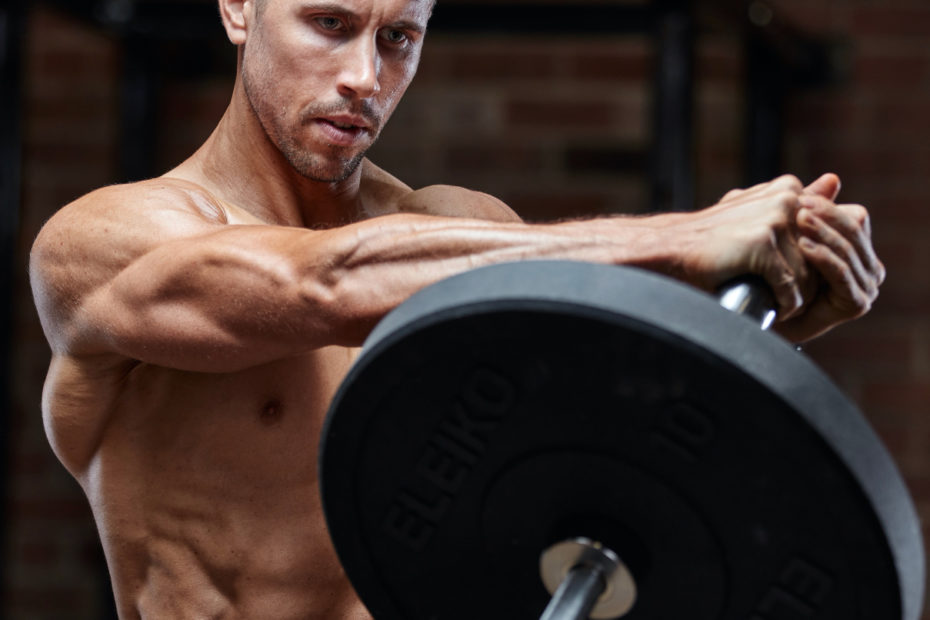The landmine offers some unique advantages to more traditional barbell, dumbbell and cable exercises. Here are six unconventional landmine exercises to add in your workout toolbox.
10 Landmine Exercises
#1 – Landmine Floor Presses
Landmine floor presses can be a useful alternative to more traditional floor presses using a bar or dumbbells. First off, the more obvious difference is how the landmine most closely resembles a single-arm floor press using a dumbbell held with a neutral grip.
Here, you’re challenging unilateral pressing strength in a relatively shoulder-friendly manner. There’s a reduced range of motion at your shoulder joint which can be useful for avoiding any potentially painful ranges of motion.
Using a neutral grip is also more shoulder-friendly in the long-run as it reduces the likelihood of your elbows from flaring, your shoulders being in a more unstable position, and your cranky joints from flipping you off.
There’s also a benefit from pressing while gripping the thick part of the bar. The feedback from many is that they experience less shoulder pain pressing with a thick grip. No one knows for sure why this is, but it’s likely due to an “irradiation” effect of increased forearm activation increasing stability at the shoulder joint.
Key points:
- Roll and press in to position, somewhat similar to the start of a Turkish get-up.
- Use both hands to allow a safe shift of your body to achieve good shoulder alignment.
- Brace your core to resist rotation through your spine and pelvis while pressing with one arm at a time.
For another option you can also try landmine floor presses with the landmine coming from the side.
#2 – Landmine Rows
Landmine rows are all the rage. And why not!? They’re smooth AF, and a great way to add meat to your upper back. But, you don’t always have to row with the landmine perpendicular and out towards the side (e.g., Meadows rows etc.).
Parallel landmine rows change up the angle and change up the grip. Since parallel landmine rows allow your elbows to stay more closely tucked in, it’s easier to perform more of a “lats-focused” row. This is as compared to more traditional Landmine rows where the pulling motion tends to be better aligned to hit your upper back (rhomboids, upper traps).
Holding the thick part of the bar during Landmine rows will do wonders for your forearms and grip strength, but parallel landmine rows allow you to hold the thinner part of the bar. Parallel landmine rows are an easier option if you or your clients have smaller hands or struggle with grip.
Another advantage here is in the ease of which you can perform a drop-set. Versus a dumbbell row, say, it’s much easier to slide off some plates than be that guy who steals all the dumbbells to do a few drop-sets.
Key points:
- Load the bar up with smaller plates to allow more range of motion.
- Stand up with the bar before hinging over, working hard to keep your hips and spine stable.
- Drive your elbow towards your hip while exhaling as you pull in.
For another landmine row option try 3-point rows.
#3 – Landmine Squats and Hack Squats
Try landmine hack squats as a novel way to light up your legs, or landmine squats as an alternative to heavy goblet squats that will allow you to lift more weight.
Did you know that because of leverage factors your landmine will be heavier at the bottom than at the top of the lift? This varies depending on the barbell and landmine unit, but one I measured recently with a 20kg bar weighed just 6kg (13lbs) at the top of a squat, and 9kg (20lbs) at the bottom.
This is important to know because, A) The resistance curve of the landmine will affect muscle activation (due to the strength curve of certain movements). And, B) It’s one reason why you should never count the landmine as part of the weight you’re using when logging it down.
The resistance curve of the landmine does not match the strength curve of squatting movements. What this means is that the weight you’re lifting at the bottom of the squat is greater than that at the top, which is the complete opposite to where you’re actually strongest during squats (at the top).
While in my eyes this doesn’t make it ideal for targeting your quads – or at least should be complimented with other exercises to compensate – this does make a good choice of exercise for hitting your glutes where they’re most active at the bottom of the squat.
This is further helped by the fact that landmine squats allow you to attain “ass-to-grass” depth more comfortably than most other squatting variations.
Key points for hack squats:
- Use a bar pad or towel on the end of the bar.
- Rest the bar on a bench to start at the bottom of the hack squat, or whip it up safely to place on your shoulders at the top.
- Have your feet slightly forward and lean back with the plates resting on your upper back.
- Descend in to your squat allowing the landmine to guide you down.
#4 – Reverse Grip Landmine Curls
Reverse grip Landmine curls aren’t just another “foo foo” over the top exercise looking for insta likes. So don’t knock this setup until you’ve tried it…
Take a look at the bicep exercises you use regularly and chances are the majority are done using a palms-up grip (supinated). This is fine, but when it comes to optimal bicep-building then you also want to consider the benefits of using the “other” grips. Namely, hammer (neutral) and palms-down (pronated) variations. If not then you’re leaving some bicep building opportunities untapped.
Reverse grip landmine curls are a useful way to train your biceps in their weakest position – The palms-down grip. This emphasizes the brachialis portion of your upper arms. The fat grip of the bar also forces your forearms to work harder.
You can do these standing, but I feel kneeling allows a more comfortable angle and grip of the bar.
Key points:
- From a tall-kneeling position, grip the bar starting roughly down the midline of your body.
- Do not allow your elbow to flare out towards the side when you begin curling.
- Your fist should travel slightly outside the line of your shoulder, allowing you to feel an intense bicep and forearm contraction at the top.
- If a full length Olympic bar is too heavy then start with a 5-foot Olympic bar or shorter EZ-curl bar.
#5 – Landmine Bears
Try using “Bear” positions for a stronger core and more varied workouts. The Bear position – down on all fours and low to the ground – is a step-up from your more traditional and boring planks.
Here, you’re working several important muscle groups including your shoulder stabilizers and core. Depending on which variation you use, the bear position trains your core to resist spinal extension and rotation, and pelvic-hip stability.
Once you’ve mastered basic bear positions (on the floor just performing shoulder taps, leg lifts, or crawling), introducing landmine variations can take them up a level and add variety to your routine.
You’ve got a few options here. First, you can hold the end of the landmine and roll it from side to side while keeping your spine and hips stable (video above). Second, you can do full-on bear crawls while wheeling out the landmine in front.
Either way, both these landmine core exercises will have you crying on your knees at the end.
Key points:
- The aim is to keep your spine and hips stable while your extremities move – your arms and/or legs.
- Keep your hips down and knees just hovering off the floor, somewhat resembling a horizontal squat.
- As far as breathing goes, just do what works best for you.
#6 – Landmine Lateral Raises
Regular dumbbell and cable lateral raises can become a chore. There’s no doubting that they’ll help you build some badass delts, but why not try mixing them up with landmine lateral raises for more of a unique stimulus!?
You might want to call these lateral raises, but really they’re more of a front/lateral/Y-raise hybrid. As such you’ll hit various portions of your delts, as well as using a relatively shoulder-friendly plane of motion.
Since the load is lower at the top of the movement (due to leverage factors) most with shoulder pain going overhead typically find this “Y” position relatively comfortable to achieve.
A word of warning, though, these are pretty darn hard even with just the bar. If you have one available then use a lighter bar. You can also start from a kneeling position if you shove an EZ bar in to the landmine unit.
As a point of reference, in the video above I’m using a 20kg bar with a 1.25kg (2.75lb) plate on the end.
Key points:
- Begin with your body directly perpendicular to the Landmine.
- Keep your arms straight and perform the lateral raise motion.
- Lift the bar all the way to the top until your arm is in a “half-Y” position.
- Do not raise so high you begin to lose the bar behind you
Bust through plateaus and take your physique to the next level! CLICK HERE to find out more about The Fitness Maverick Online Coaching Program.

I build Olympians, Cover Models and those who want to look like them. Author or “Ultimate Abs” available in all good book stores.
